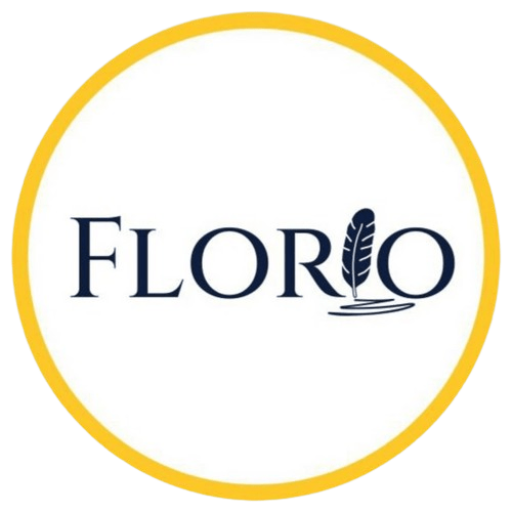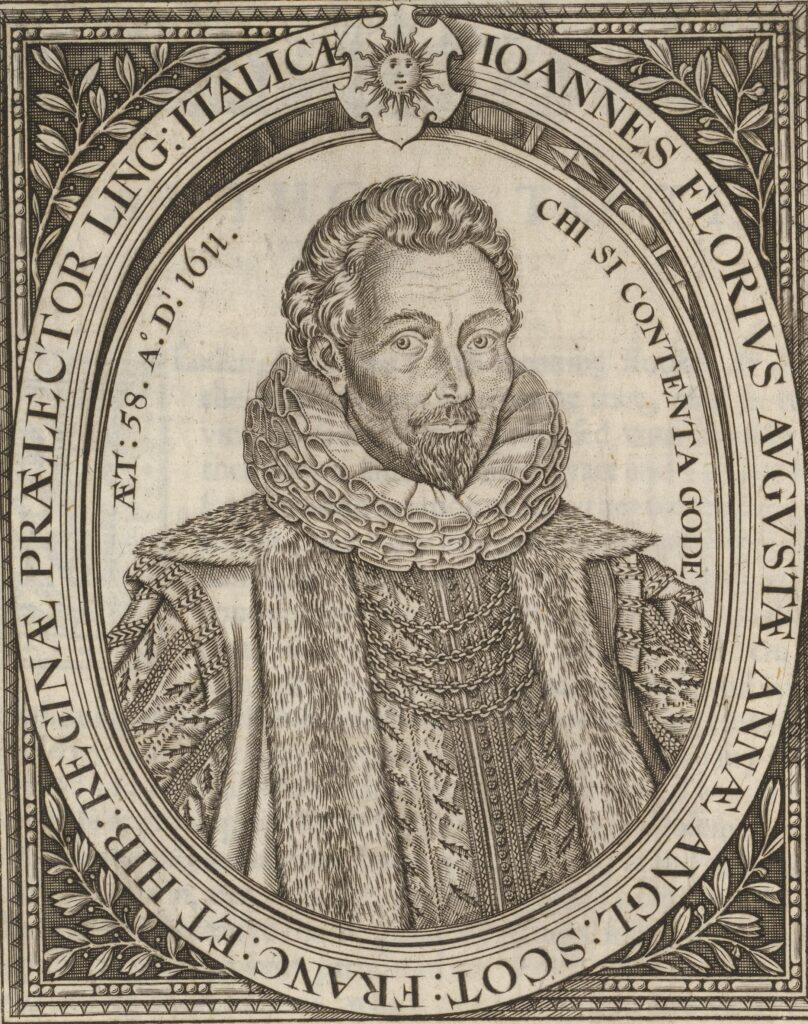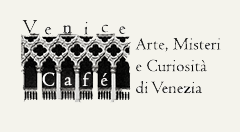Elizabeth I ascended to the throne on November 17th 1558. The first actions as Queen was the establishment of an English Protestant church. Therefore, England was finally no longer a threat for John. At about 18 years old, after his formative years in Soglio and in Tubingen, he came back to London.
John Florio’s First Fruits
At 25 years old John Florio published Firste Fruites (1578). 1 This collection of dramatic dialogues contains translated passages from literature and philosophy. Moreover, it is designed for novices in both the Italian and English language. Florio inscribed the manual to “All Italian gentlemen and merchants who delight in the English tongue”. He dedicated his first work to Robert Dudley, Earl of Leicester. In the dedication, John reminded Dudley of his father’s faithful service, successfully entering his social circle:
“Since I am issued from the bowels of him who was your faithful and devoted vassal and have consequently succeeded to the same service and devotion, I would fain be numbered, if it please Your Excellency, among those who serve you with perfect love.” 2
John Florio & Leicester’s Men
In the manual, John Florio refers to himself as “povero artigiano” (poor artisan). His insistence upon the fact that the teaching was not his profession indicates that this was the very first time he approached to the languages as profession. In addition, the commendatory verses that precede Firste Fruites show that John Florio got in contact with the Dudley’s theatre company: The Leicester’s men. The first pages of the First Fruits, in fact, contain various commendatory verses written by the company actors: Richard Tarlton, Robert Wilson, Thomas Clarke, and John Bentley. They thank him for having contributed to bring the Italian novelist to the English theatre.
“In Prayse of Florio – his Labour: if we at home, by Florios paynes may win, to know the things, that travailes great would aske: By openyng that, which heretofore hath bin a daungerous journey, and a feareful taske. Why then ech Reader that his Booke doe see, Give Florio thankes, that tooke such paines for thee.” – Richard Tarlton’s dedication to John Florio in the First Fruits.
John Florio in Oxford
With Firste Fruites, John Florio began a new career in London in the language-teaching while having contacts with the theatre. Subsequently, by the summer of 1578, he was sent by Lord Burleigh, William Cecil, to Oxford at the Magdalen College. He entered as poor scholar and became servant and tutor of Italian language to Barnabe and Emmanuel Barnes, sons of the Bishop of Durham. John Florio remained at Oxford at least until 1582. According to the Athenae-Oxoniensis, he was later allowed to wear the academic gown. 3
Euphuism
During these years John matured as a lexicographer and made the development of modern English language his primary mission. Firstly, he became tutor of Italian language to John Lyly. Author considered to be the first English prose stylist to leave an enduring impression upon the language, Lyly was a key figure of Euphuism. Another Euphuist and pupil of John Florio was Stephen Gosson. Both Gosson and Lyly adopted the Euphuistic style and were saturated in Italian reading through John Florio’s lessons. It is possible that another Euphuist, George Pattie was the “I.P.” that signed Italian verses before the First Fruits. 4
John Florio & Samuel Daniel
John Florio’s social climbing in Oxford continued when he began a long-lasting friendship with Samuel Daniel. English poet and historian, Daniel exerted a considerable influence on the development of Elizabethan and Jacobean poetry. Daniel matriculated on 17 November 1581 at Oxford; there he met Florio, who had been teaching from 1580. By 1582 Daniel contributed to a short poem to the manuscript of Florio’s Giardino di Ricreatione.
Daniel’s Paolo Giovio: Florio behind N.W.
It has been suggested that Daniel began taking Italian lessons under Castelvetro around 1579 when he was 15 or 16 years old. Later, he continued when he arrived in Oxford with John Florio.5 This would explain how in 1585, with the help of John Florio, he published his translation of Paolo Giovio’s The Worthy tract of Paulus Iovius (1585). John Florio signed the preface before Daniel’s work behind the pseudonym N.W. In the preface, he contrasts this worthy enterprise with other types of reading matter:
“For it Courtiers are inwardly rauished in vewing the Picture of Fiammetta which Boccace limned. If Ladies eintertaine Bandel or Ariosto in their Closets. If Louers imbrace their Phisition Ouid in extremitie of their passion: then will Gentlemen of all tribes, much rather honor your Impresa, as a most rare Iewell, and delicate Enchiridion.” – fol *4 – *5
Florio quotes Boccaccio, Ariosto, Bandello
In all these cases, the analogies drawn by John Florio are to private, intimate encounters. The “inwardly ravished” courtier uses the Fiammetta as an exploration of the interiorized rhetoric of the emotion; the chivalric, even lurid narrative of Ariosto and Bandello are consumed by ladies in their “closets” (echoing a typical plot device of such tales), and lovers turn to the classical “Physition” of the erotic Ovid, for an explanation of their symptoms.6Coming from the life-changing experience at the French Embassy with Giordano Bruno, in the preface, Florio adds a defense of translation, evoking Giordano Bruno who talked to him about the importance of translation. He will write a similar defense in his superb defense of translation in Montaigne’s Essays (1603):
“You cannot forget that which Nolanus (that man of infinite titles among other phantasticall toyes) truely noted by chaunce in our Schooles, that by the helpe of translations, al Sciences had their ofspring.”
N.W. in S. Daniel, The Worthy Tract of Paulus Iovius, 1585, 7.
My old fellowe Nolano told me, and taught publikely, that from translation all science had its ofspring…”
John Florio in Montaigne Essays, 1603, To The Reader.
John Florio & Matthew Gwinne
Matthew Gwinne was another close friend John Florio met in Oxford. Physician and playwright, Gwinne will contribute to write commendatory verses in Florio’s works behind the pseudonym “Il Candido”. Florio mentioned him in the Epistle Dedicatory of Montaigne’s Essays (1603) as his “only dearest and in love-sympathising friend”:
“The other (my onelie dearest and in love-sypathising friend, Maister Doctor Guinne, of whome I may justly say what my Authour saith of his second-selfe Steven de Boetie: for, he could not better pourtray him for him selfe, then he hath lively delineated him for me) willing to doe me ease, and as willing to doe your Honour service, as you know him a scholler (and pitty is it the World knowes not his worth better; for as the Prince of Italian poets saide of Valerius Corvinus, Non so se miglior Duce o Cavalliero, so may I truely say of him. Non so se meglior Oratore e Poeta, o Philosopho e Medico).
John Florio, Preface to Montaigne’s Essays, 1603
John Florio’s first translation: Cartier’s Voyages
In Oxford, beside his job as Italian tutor, John Florio also began a career as translator. He met Richard Hakluyt, an English writer who was very passionate about maritime literature. His collaboration with Florio was very fruitful: he commissioned him to translate Jacques Cartier’s voyage to Canada. Later, in 1580, Florio published his translation under the name A Shorte and briefe narration of the two navigations and discoveries to the northweast partes called Newe Fraunce: first translated out of French into Italian by that famous learned man Gio : Bapt : Ramutius, and now turned into English by John Florio; worthy the reading of all venturers, travellers, and discoverers.
Florio’s colonial adventures
Florio quickly developed an awareness of the potential of the ‘New World’. In fact, he was among the first Englishmen, if not the very first, to suggest that the newly discovered lands across the ocean should be permanently colonised by settlers from the mother country. In the preface, he addressed all the “Gentlemen, Merchants and Pilots” to “trasporte our Beasts and cattle of Europe into those large and champion countreys”:
“Iohannes Vorazzana, a Florentine, if he had not been preuented by death, purposed (as the foresaid Ramusis wrote) to persuade Francis the French King to send forth good store of people to inhabite certaine places of these coastes, where the aire is moste temperate, and the soyle most fruitfull, with goodly Riuers and Hauens sufficient to harborough any nauie, the inhabitantes of which places might be occasion to bring many good purposes to effecte, and amongest manye others, to reduce those poore rude and ignorant people to the true worship and seruice of God, and to teache them how to manure and tall the ground, transporting our Beasts and cattle of Europe into those large and champion countreys.” – John Florio, To The Reader, Shorte and briefe narration of the two navigations and discoveries to the northweast partes called Newe Fraunce, 1580.
Florio advocates “planting” the “New-found land” four years before Hakluyt and Raleigh, the pioneers of colonisation. He threw himself early into the spirit of these English patriotic ventures. Furthermore, he committed himself to both refine the English language and be a contributor of England’s colonial enterprise.
Edward Dyer
In Oxford John Florio also met Sir Edward Dyer, poet and courtier. He dedicated to him the first version of Giardino di Ricreatione, a collection of proverbs he published in 1591 along with Second Fruits. The first version, handwritten by Florio, is at The British Library. It contains an handwritten dedication from Florio to Edward Dyer dated November 12, 1582. The dedication suggests that Dyer had been of some service to him. Above all, it indicates a sincere appreciation of his qualities as an Italian scholar. This discredit Yates’ theory that Florio attacked him in First Fruites. 7 Thanks to more recent discoveries about his early career, in fact, the dialogues in First Fruites do not refer to Edward Dyer as suggested by Yates, but to his early job as dyer.
John Florio & Giordano Bruno
The last, and most important meeting John Florio had at Oxford was with the Italian philosopher Giordano Bruno, one of the most adventurous thinkers of the Renaissance. In Oxford, he took two lessons: one on the immortality of the soul, the other upon the quintuplici sphera. In addition, both Florio and Bruno attended the arrival of the Prince Laski in Oxford. Bruno attended the event with Philip Sidney, his patron. On that famous occasion, many figures, friends of Florio, held the event: Matthew Gwinne and Samuel Daniel among the others. The French Ambassador Michel de Castelnau was in Oxford as well, and asked Florio to become tutor of his daughter Catherine Marie. Subsequently, in the summer of 1582, John Florio moved to London at the French Embassy with Giordano Bruno.
Bibliography
- Armstrong, G., The English Boccaccio: A History in Books, University of Toronto Press, 2019.
- Del Re, A., Florio’s First Fruites: Facsimile Reproduction of the Original Edition, Volume II, Introduction and Notes, 1936.
- Franzero, C. M., John Florio a Londra ai tempi di Shakespeare, Guanda, 1969.
- Woudhuysen, H. R., Sir Philip Sidney and the Circulation of Manuscripts, 1558-1640, Clarendon Press, Oxford, 1996.
- Yates, F. A., John Florio: The Apostle of the Renaissance in Shakespeare’s England, Cambridge University Press, 1934.
Notes
- Original title as follows: which yeelde familiar speech, merie prouerbes, wittie sentences, and golden sayings. Also a perfect induction to the Italian, and English tongues, as in the table appeareth. The like heretofore, neuer by any man published.
- Original text in Italian as follows: “Massime per essere io uscito dalle viscere di chi [Michelangelo] vi è stato fedele e devoto vassallo, e conseguentemente essendo io restato successore della medesima servitù e devozione, vorrei così piacendo alla Vostra Eccellenza essere nel numero di quelli che con perfetto amore vi servono.”
- Franzero, C. M., John Florio a Londra ai tempi di Shakespeare, Guanda, 1969, p. 71. Magdalene College today commemorates his time there with the John Florio Society that meets to appreciate its members’ own poems.
- Yates, F. A. John Florio, The Apostle of the Renaissance in Shakespeare’s England, 1934, Cambridge University Press, pg. 50
- Woudhuysen, H. R., Sir Philip Sidney and the Circulation of Manuscripts, 1558-1640, Clarendon Press, Oxford, 1996, p. 362.
- Armstrong, G., The English Boccaccio: A History in Books, University of Toronto Press, 2019 p. 186
- Del Re, A., Florio’s First fruites: facsimile reproduction of the original edition, Volume II, Introduction and Notes, 1936.




